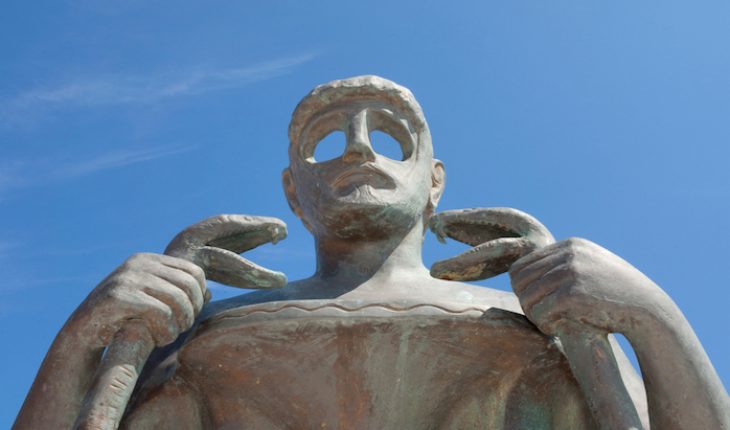The mesmeric impact of an ancient Greek doctor on many hundreds of years of medicine is one of the more remarkable artefacts of the history of the world.
I found it so fascinating that more than 20 years ago I wrote a book about Hippocrates and used his famed Oath as a foil to some current trends in medicine – all the way from threats to the idea of medicine as a profession, to the very ancient but also very modern issue of euthanasia. Yet while traditional Hippocratic values are under constant threat, the perennial character of so many of these discussions reminds us how little medicine has actually changed – for all our advances in science and technology. I’d venture that if Hippocrates found himself on a ward round today or in a classroom with medical students it would not take him long to feel at home – once he had ditched his toga for a white coat.
The reason why Hippocrates of Cos, to give him his full name, has had such an influence lies in the combination of two factors in the writings attributed to him, including the famous Oath. There is an emphasis on what we would call clinical excellence. And there is an emphasis on ethics. And the two go together. You end up with a practitioner who is both entirely committed to the good of the patient, and deeply accountable to his (or, today, of course, her) fellows.
That, in a nutshell, is the “professional” idea – which has been explored and assessed by modern writers, especially the famed sociologist Eliot Friedson, whose work helped awaken my interest in the long shadow cast by Dr H.
The point is: doctors need to focus on being skilful as well as ethical practitioners, and “the profession” – a complex society or guild of doctors all watching over and aiding each other – keeps them so. While medical practice has morphed into different shapes in different parts of the globe, there are generally strong elements of professional self-government still in evidence. Here in the UK, the strongest is provided by the continuing role of the General Medical Council, and the influence of the royal medical societies. A key component in the “professional” idea is that unlike most human occupations and activities neither the consumer (the patient) nor the government is well-qualified to assess what is going on; so mutual accountability among members of the profession takes the place of both consumerist and government oversight. The same dynamics apply in the legal profession, and to a lesser degree in other occupations that increasingly claim the vaunted title for themselves. Of course, this is very different from the traditional role of the trade union, which is to protect its members rather than keep them accountable. Teachers’ unions, especially, that desire to be professional associations, tend to find this double role hard to fulfil. But for doctors, it needs to be all about the patient.
That’s one reason I love the remarkable U.S. television series House, M.D. Its focus is on Greg House, a thoroughly unpleasant but brilliant doctor – who is absolutely, utterly, fixatedly, committed to doing the right thing for his patients.
Hippocrates is said to have been born around 460 BC – there’s some disagreement on his exact dates, though he does seem to have died a very old man. His name is associated with a whole series of documents, including of course the Oath, which scholars refer to (amusingly) as the Hippocratic Corpus. You can read them in the parallel Greek and English-Loeb edition, and they make for very good reading. Especially the Epidemics, which reads very like a set of modern case notes and chronicles the course of disease in many individual patients – who end up either getting better, or dead. If you need evidence that medicine in the ancient world was very like medicine today, the Epidemics proves it.
There’s also disagreement about how much, if any, of the Corpus was actually written by Dr H. That includes the Oath itself. From one point of view it doesn’t much matter – it’s plain that a “school,” whether formal or informal, arose around the good doctor and carried on his work. But it’s nice to think of him scribbling down, no doubt in illegible, prescription-quality, Greek, at least some of these amazing documents. Scholars disagree somewhat, though when I was studying the debates I was very taken with the work of the great medical historian Ludwig Edelstein, who identified Hippocrates with the ancient Greek philosophers known as Pythagoreans, who had some very distinctive beliefs. What’s interesting is that they were minority beliefs at the time (for example, they were opposed to euthanasia), but the doctors who took their lead from Hippocrates ended up becoming the mainstream of Greek medicine. One reason may well have been that people wanted doctors they could trust, even if they didn’t always agree with their views.
Back to Hippocrates’ mesmeric influence. My friend Dr Robert Orr led landmark research a few years ago into the use of the Hippocratic Oath in U.S. medical schools. Its results were fascinating. During the 20th century, use of something generally called the Hippocratic Oath in the graduation ceremonies of medical schools actually grew. In fact, there were several versions of it in circulation, with various amendments made either to bring it up-to-date (who wants to swear by ancient gods today?) or to make it less controversial (yes, the Oath does say No to abortion as well as euthanasia) – or both. His research showed that as more schools used the Oath the specificity of its requirements actually diminished. But what is truly remarkable is that medical education, at least in the United States, feels the need to doff its cap to the best-known of all doctors, and the most plainly ethical, more than two millennia later.
And this is the key takeaway. Medicine is a moral art. It is not just a job that applies science to sick customers. It involves a fundamental ethical commitment to the care of the patient, both to “do no harm,” and to do good; which involves the doctor being equally an excellent ethicist and an excellent clinician.
Hippocrates saw this so clearly and stated it so compellingly that he continues to be the inspiration for all good medicine today.
So he would be an avid reader of the Hippocratic Post.
- Why Hippocrates would welcome The Hippocratic Post - 9th May 2016







